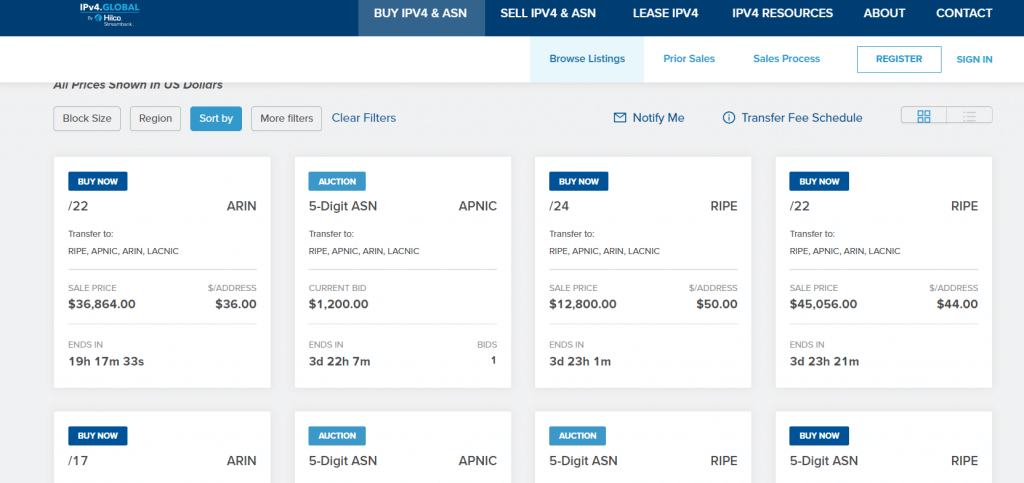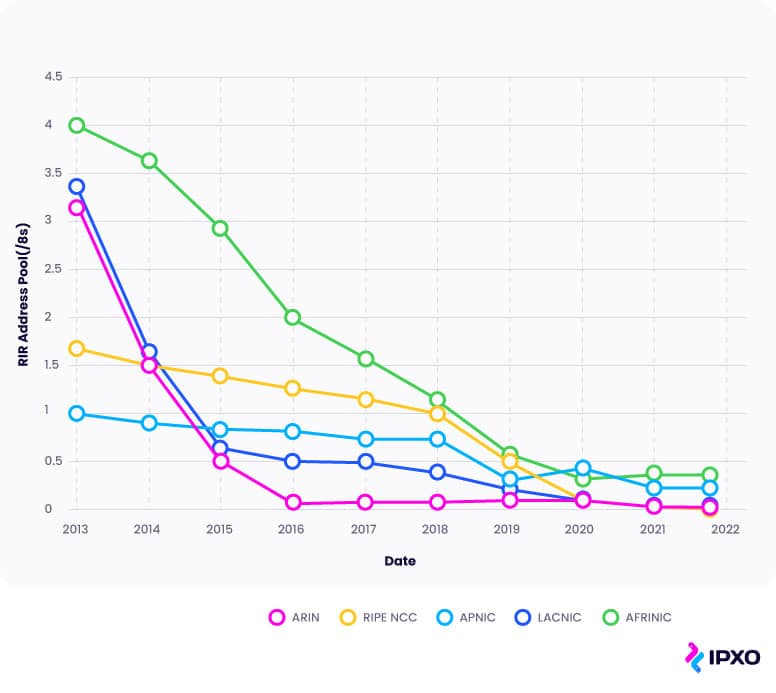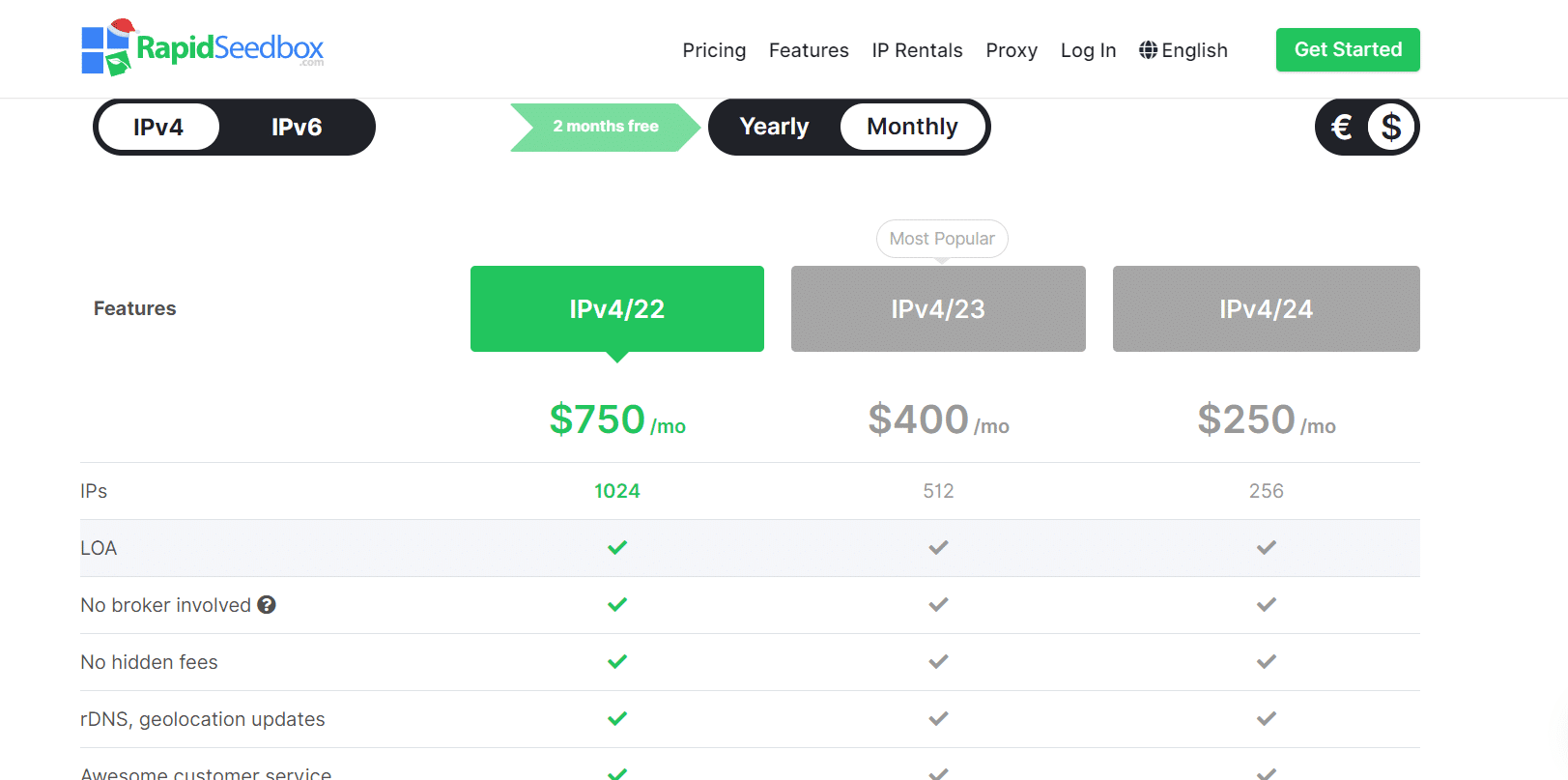Today, when internet connectivity is as crucial as having electricity, the role of IPv4 addresses has become increasingly significant.
As an expert in the field with years of networking experience, I’ve witnessed the evolution of IPv4. Back in the day, it seemed like an endless resource, but fast forward to today, IPv4 addresses are a rare commodity.
This led to the emergence of IPv4 auctions. That’s why, today you’ll find out what IPv4 auctions are, why they matter, and what moves their pricing. I’ll also give you a practical alternative, so read until the end!
Table of Contents.
- Why are IPv4 Addresses so Valuable?
- What is an IPv4 Auction?
- How do IPv4 Auctions Work?
- What Influences IPv4 Auction Prices?
- Benefits of Buying IPv4 Addresses via an Auction
- Leasing vs Buying IPv4 Addresses
- Leasing IPv4 Addresses: A Better Alternative for Most
- IPv4 Auctions – Final Words
Why are IPv4 Addresses so Valuable?
IPv4 was established in the early 1980s and offered approximately 4 billion unique addresses.
At the time, this seemed more than sufficient. However, the explosive growth of the internet has led to a near depletion of these addresses, turning them into a valuable commodity.
The scarcity of IPv4 addresses has not only increased their value but also led to innovative solutions like Network Address Translation (NAT) and subnetting to extend their usability.
Despite the introduction of IPv6, IPv4 remains dominant due to its widespread adoption and compatibility. The latter is the main reason why businesses need IPv4 addresses. Although IPv6 has been around for several years, the devices we are using are mostly IPv4-only compatible.
What is an IPv4 Auction?
IPv4 auctions are marketplaces where IPv4 addresses are bought and sold. With the exhaustion of IPv4 addresses and the slow adoption of IPv6, these auctions have become a hotspot for companies seeking to expand their digital footprint.
As an IPv4 user myself, I’ve seen how these auctions operate: sellers list their unused IPv4 addresses, and buyers bid on them, like on any other auction.
How do IPv4 Auctions Work?
The auction process typically involves several stages:
- Registration: Participants, both buyers and sellers, register on an IPv4 auction platform. The most popular platforms are IPv4 Global and IPv4 Connect.
- Listing and bidding: The platforms list sellers’ IPv4 blocks, and buyers can bid on them.
- Winning the bid: The highest bidder usually wins the IPv4 addresses. It’s that simple.

What Influences IPv4 Auction Prices?
If you don’t have the time to read, here’s the TL:DR version:
- Limited pool of IPv4 addresses: The limited availability of IPv4 addresses is driving the prices up. Naturally, the more these addresses become rarer, the more their value increases.
- Market demand: The demand for IPv4 addresses depends on the growth of internet services. When more businesses go online, the demand for these addresses goes up.
- The size of the IPv4 block: In case you didn’t know there are different types of blocks depending on their size. The most common are:
- IPv4/22 – This includes 1024 IP addresses.
- IPv4/23 – 512 IP addresses.
- IPv4/24 – 256 IP addresses.
- The larger blocks often fetch higher prices, since they allow for scaling.
- Geographical location: The location of the IPv4 addresses also plays a part in the forming of the price. Certain regions (you can guess which ones easily) have higher demand, affecting the cost.
Now that you know the key factors that play a role in forming IPv4 auction prices, let’s dive deeper.
Supply and Demand
At the heart of IPv4 auction pricing lies the classic economic principle of supply and demand.
IPv4 addresses are a finite resource. There are only about 4.3 billion of them, unlike the seemingly infinity pool of IPv6 ones.
With the internet’s expansion of connected devices, the demand for these addresses has skyrocketed.
However, the supply remains capped, leading to increased competition and higher prices in auctions. It’s a straightforward case of more people chasing fewer goods, a scenario that inevitably pushes prices upward.
Size and Quality of IPv4 Blocks
The size of the IPv4 address blocks up for auction significantly impacts their price. Larger blocks, such as /16s (65,536 addresses) or /8s (16.7 million addresses), are highly sought after. Naturally, their prices have skyrocketed (think close to a billion USD).
This is due to their scalability and efficiency in network management. Such larger blocks often command premium prices.
Additionally, the quality of the block, in terms of its reputation and cleanliness (free from blacklisting or previous misuse), also plays a crucial role in determining its value, so the price for such a premium block can exceed a billion dollars.
Regional Variations
The geographical location of the IPv4 addresses also influences auction prices. Certain regions have a higher demand for IPv4 addresses due to their economic and technological development, leading to higher prices in those areas.
For example, IPv4 addresses in North America are priced differently than those in Asia or Europe, reflecting the varying levels of demand across these regions.

Market Trends and Historical Transactions
The IPv4 market is also influenced by broader market trends and historical transactions.
Significant purchases by large corporations, or trends in technology adoption can set prices soaring high. For example, the huge acquisition of a large IPv4 block by a tech giant, like Microsoft (read below), can signal the market of a higher valuation, skyrocketing the auction prices.
Regulatory and Policy Changes
Last but not least, regulatory and policy changes can impact IPv4 auction prices.
Decisions by the Regional Internet Registries (RIRs) regarding the distribution and transfer policies of IPv4 addresses can either constrict or expand the market.
Needless to say, this affects the prices. Changes in internet governance policies or shifts in the regulatory landscape can also play a role in shaping the IPv4 auction market dynamics.
Benefits of Buying IPv4 Addresses via an Auction
Getting IPv4 addresses through an auction is more than just acquiring a digital asset.
Consider it more of an investment in the company’s future digital infrastructure.
Winning an auction provides businesses with the necessary resources to expand their online presence, It also ensures long-term operational stability in a market where IPv4 addresses are becoming increasingly scarce and valuable.
Moreover, even if things don’t work out, you can potentially sell these addresses at a higher price at a later date.
As a reference, Microsoft bought 666,624 IPv4 addresses in 2011 for about $11.25 per IPv4 address. Today, a little over 10 years later, the prices are 3-5 times higher than that. Still, keep in mind that as with every asset, there is no certainty the prices will continue going up.
However, buying IPv4 addresses via an auction requires a substantial initial investment, so let me give you a practical alternative.
Leasing vs Buying IPv4 Addresses
While IPv4 auctions offer a permanent solution for acquiring IP addresses, leasing them is an increasingly popular alternative.
I will not waste any of your precious time, so here’s a practical table I created to showcase the pros and cons of owning vs leasing IPv4 addresses.
| Aspect | Leasing IPv4 Address | Buying IPv4 Address at Auction |
|---|---|---|
| Cost | Pro: More affordable with much lower upfront costs. | Con: Requires a significant upfront investment, often at a premium price. |
| Con: Ongoing payments; can be costlier over an extended period. | Pro: One-time investment with no recurring costs. | |
| Flexibility | Pro: Offers adaptability to scale up or down based on changing needs. | Con: Less flexibility; once purchased, the scale is fixed. |
| Simplicity | Pro: Typically a straightforward and quicker process. | Con: Can be complex and time-consuming, involving bidding and negotiations. |
| Maintenance | Pro: Maintenance and administrative responsibilities often lie with the lessor. | Con: Full responsibility for maintenance and administration. |
| Long-Term Value | Con: No long-term asset accumulation; purely rental-based. | Con: Market risks, including potential depreciation. |
| Strategic Control | Con: Less control over the IP assets as they are not owned. | Pro: Complete control over the IP assets. |
| Market Dependency | Pro: Less affected by market fluctuations in IP pricing. | Con: Market risks, including potential depreciation in value. |
| Commitment | Pro: Lower commitment, suitable for short-term or project-based needs. | Con: High commitment, more suitable for long-term, stable requirements. |
As you can see, there are different benefits for both options, depending on your business needs.
If you’ve already made up your mind and want to buy an IPv4 block at an auction, stop reading here.
However, if you are contemplating leasing IPv4 addresses, here’s what you need to know.
Leasing IPv4 Addresses: A Better Alternative for Most
While IPv4 auctions offer a permanent solution, leasing IPv4 addresses emerges as a practical alternative.
Leasing provides flexibility, cost-effectiveness, and simplicity. It allows businesses to use IPv4 addresses for a specific period without the long-term financial commitment of purchasing.
This is especially suitable for small to mid-sized businesses or companies with fluctuating IP needs.
Here’s why leasing might be a better option than buying an IPv4 address:
- Cost-effectiveness: Leasing IPv4 addresses is generally much more affordable than buying them outright in an auction. This is particularly beneficial for small to medium-sized businesses.
- To put things in perspective, buying 256 IPv4 addresses at an action will cost you on average $50 per IP address. That’s $12,800 upfront, hard cash. If you lease them, however, the price for the same block size is going to be $250/month, which is much more manageable.

- To put things in perspective, buying 256 IPv4 addresses at an action will cost you on average $50 per IP address. That’s $12,800 upfront, hard cash. If you lease them, however, the price for the same block size is going to be $250/month, which is much more manageable.
- Flexibility: Leasing offers flexibility in terms of contract duration. Companies can lease addresses for the exact period they need them, avoiding long-term commitments.
- Simplicity: The process of leasing is much simpler and way faster than participating in auctions. This is crucial for businesses needing quick access to IPv4 addresses.
- No maintenance hassles: It’s like renting vs buying a house. When you lease IPv4 addresses, the responsibility of maintaining the IP blocks lies with the lessor, reducing the administrative burden on your business.
Looking for IPv4 addresses?
Secure your IPv4 addresses with RapidSeedbox’s IP rental services. Enjoy reliable performance, enhanced security, and exceptional support for all your networking needs.
IPv4 Auctions – Final Words
IPv4 auctions and leasing represent the two most critical strategies in managing the limited resources of IPv4 addresses.
As the internet continues to grow, understanding and taking advantage of these options is crucial for all digital businesses.
While auctions provide a permanent solution, leasing offers a flexible and cost-effective alternative, making it an attractive option for many businesses.
If you want to lease IPv4 addresses, we’ve got you covered. Just pick a plan from RapidSeedbox and you are good to go.
0Comments